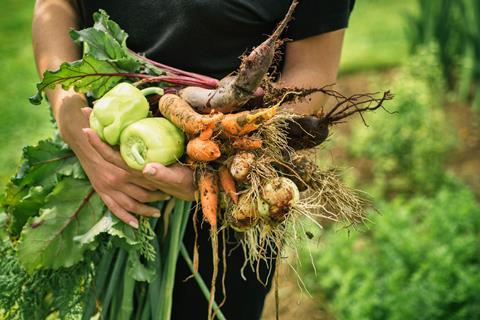UK growers are unable to match burgeoning demand in organic as new figures show low conversion rates due to uncertain farming policies

Organic land in the UK is failing to keep pace with consumer demand
A growing demand for organic produce is a “missed opportunity” for UK growers that is being handed to European suppliers as new data shows a decline in organic farmland.
The latest stats on organic farmland statistics released by Defra have been called “disappointing” by organic charity and certification body the Soil Association, which said the downward trend is failing to keep pace with a growing market for organic produce.
Demand for organic food and drink in the UK rose by 7.3 per cent in 2024, while data for the first quarter of 2025 shows further volume and value growth of 10 per cent over the last 12 weeks, according to NIQ Scantrack data.
“What is so disappointing is that the opportunity to supply the growing organic market is now being handed on a plate to farmers in the EU,” said Soil Association organic development advisor, Adrian Steele.
The Soil Association said that decisions over whether to convert to organic in England in particular were impacted “immediately” by the overnight closure of the Sustainable Farming Incentive (SFI) subsidy scheme.
“Nine out of ten farmers, attending a recent webinar for those considering switching to sustainable, organic and nature-friendly farming, have expressed their frustration that the door has been shut on SFI payments which would support them to make the transition, discouraging them to commit without the reassurance that this offers,” said Steele.
The total amount of organic farmland in the UK rose by one per cent during 2024, but there were steep declines in the amount under conversion, particularly in Wales, alongside strong increases in Scotland, which suggest a mixed picture for the future. Total organic farmland in Wales fell by nine per cent, while land in conversion to organic fell by 45 per cent.
Land in conversion in England rose by seven per cent, while the total land farmed organically stayed largely flat with an increase of one per cent.
Bucking the trend and driven by new entrants to organic farming, the amount of land in conversion to organic in Scotland doubled during the last year.
In its sixth year of growth for organic farmland, the Soil Association said Scotland is continuing to lead the way with strong government support and ambitious targets to boost nature-friendly farming.
“England is falling significantly behind with little or no discernible growth in total organic farmland in ten years and the freezing of the Sustainable Farming Incentives having an immediate impact on organic conversions,” said Steele.
Soil Association’s commercial director Georgia Phillips said: “This looks like a repeat of last year’s organic farmland stats, revealing sustained strong performance by Scotland where there is clear government support, and a lack lustre performance by the rest of the UK.
“It’s a missed opportunity we must grasp for the UK to boost our organic farmland in line with the burgeoning organic market. By addressing this we will realise significant benefits for UK farmers, our health, nature and the environment.”
The Soil Association said it wants the government to replace the Sustainable Farming Initiative with a programme to “unlock the potential” for home-grown organic produce.
“We know that there are plenty of farmers who want to shift their system of production to be more in tune with nature,” said Phillips.
“But they need the reassurance that the government is committed to meeting its environmental targets and fully behind a sustainable and resilient approach to farming,” she added.



